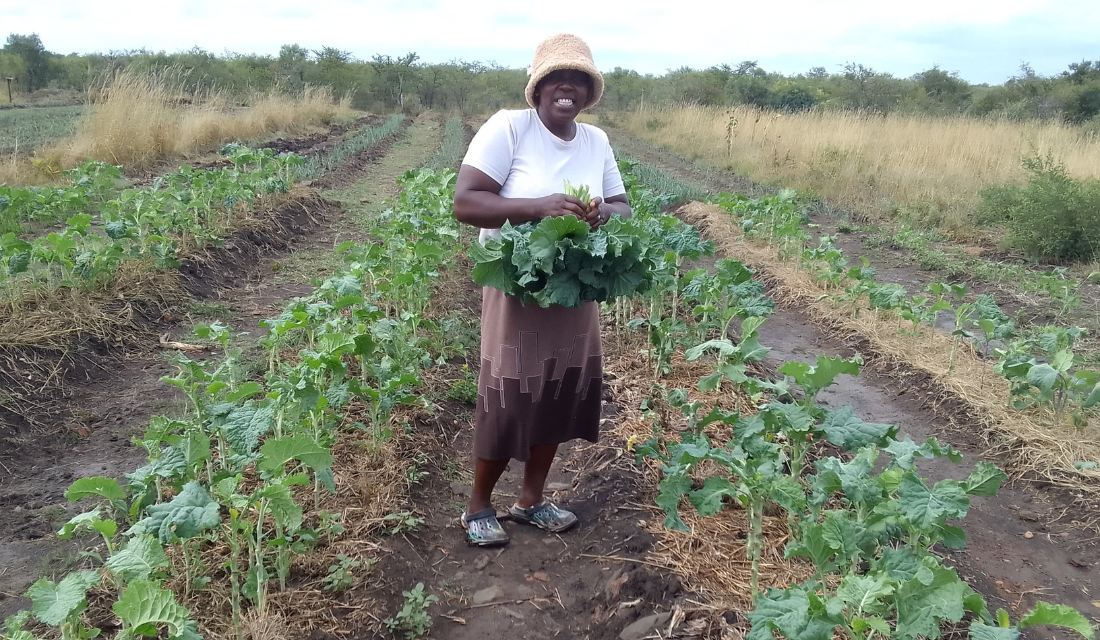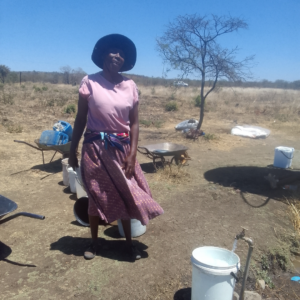In Zimbabwe, Access to Water Creates Opportunities

In 2024, Zimbabwe was one of five countries in Southern Africa to declare a national disaster during the region’s worst drought in decades.
Zimbabwe’s Matabeleland South and Matabeleland North provinces are home to many small, rural communities where agriculture is a major part of daily life. People in the area farm the land and raise animals for a variety of reasons: to feed their families, earn an income or both. The longer the drought period, the tougher this becomes as riverbeds, reservoirs and watering stations quickly dry up.
We partner with the Anglican Diocese of Matabeleland to help these communities prepare for, address and mitigate the challenges of a changing climate. From 2015 to 2024, this climate resilience program has reached 39, 316 people throughout the Matabeleland area.

“Water is life, for sure,” according to Jane, a farmer from a small village in Matabeleland North called Mbembesi.
In Mahaja, a village in Matabeleland South, a community leader named Chief Dambisamahubo explained, “This area is known to be dry and the only source of water is an open dam, which is not safe for human consumption.”
Part of helping communities, like Mbembesi and Mahaja, strengthen climate and drought resilience involves improving existing water infrastructure like dams, reservoirs and water supply systems. In some communities, our partner, the Anglican Diocese of Matabeleland, drilled deep wells to access subterranean water. A powerful pump brings water to the surface, circulates it through filters and carries it via pipes to people’s homes, central watering stations and other locations where water is needed. Many communities we serve are remote and don’t have stable access to electricity, so we construct water systems that are powered by solar panels.
Due to the drought, people in communities across the Matabeleland region had not been able to plant a rainy-season crop, so they were excited to break ground. With support from our partner, participants formed community-led gardening and horticulture groups.
Using a mix of traditional and climate-adaptive farming methods, the garden group in Mbembesi transformed a scorched community field into a vegetable garden with crops including kale, onion, tomato, carrots, maize and beetroot. Gardening alongside one another, participants nurtured lasting bonds of trust and helped each other succeed. Together, they learned strategies and practiced hands-on techniques for curbing soil erosion, improving water retention, diversifying crops and restoring damaged land for future generations to cultivate.
“As long as we have water, strong leadership and support,
all things are possible.”
— Nomagqika
Across the region, garden groups reported that participants were harvesting plenty to feed their families, with surplus left to sell at market. They used their earnings in a variety of ways. Some contributed to household necessities or covered the cost of emergency expenses. Others diversified their income by starting a small business or investing in poultry or livestock. One participant was proud to be able to make offerings at her church, something she couldn’t afford to do in the past.
“Personally,” said a Mahaja community gardener named Judith, “I have managed to clear school fees for my four primary school-aged kids.”
Nomagqika, a Mbembesi garden group member, is no stranger to the harmful impact severe drought conditions can have on a farming community. During a drought, it’s hard to stay motivated and easy to lose hope. But, with improved access to water for drinking and agriculture, Nomagqika felt her aspirations return.
Recently, she shared, a popular local restaurant started buying vegetables exclusively from her, preferring the quality of the produce over that of the big city vendors.
“As long as we have water, strong leadership and support,” Nomagqika said, “all things are possible.”


